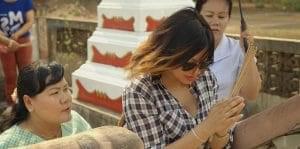
The ultimate lottery in life is your family. It’s that one thing in life, where you have no choice or influence and you’re stuck with what you’re given. No refunds. No returns. No matter the cards you’re dealt, good or bad, your family has an incredible influence on the type of person will become.
For director and subject Kulap Vilaysack, she takes us along her journey of discovering her Origin Story. The film opens with an animated account of the most pivotal moment in her life. As a child, she interjected herself into a heated argument between her parents by taking the side of her father. In a fit of rage, Kulap’s mother asks her why she’s taking his side, “he’s not your real father.” At this moment, everything she understood about her family became a lie.

“…asks her why she’s taking his side, ‘he’s not your real father.'”
As any good family does when things blow up and get out of hand, they never talk about it again and burying it in that deep dark part of their soul. And as any good child does, she waits far into adulthood and confronts her family demons with a documentary camera crew to capture every moment. I may sound like I’m making light of Kulap’s story, but considering her husband is Scott Aukerman and the friends she confides in are Sarah Silverman and Casey Wilson, humor and friendship plays a big part in the healing process.
Origin Story starts with the aftereffects of learning the truth as Kulap looks back at family gatherings wondering why her relatives never treated her the same as her now step-sisters. She then talks to the people who were close to her family as a child and knew the secret including her father and her American sponsor family when her mother came to the states as a refugee from Laos. She poses the obvious question, “why did you lie to me?”
Next, Kulap takes a long trip to visit her mother and step-sisters and convinces her to talk about what happened for the documentary. Reluctantly, her mother agrees and not only do they talk about the lie, but also how mentally and emotionally traumatizing it was to live under her rule. The truth does come out, but you see Kulap’s mother say things like “You think, I’m a liar” and “I’m a bitch” as a defense mechanism. Almost as if to say, “I’m not the perfect mother, so why do you hate me so much?” On the flip side, we are told her mother’s story of fleeing Laos when the communists took over and the tough personal decision she had to make to come to the U.S.

“Its revelation had a devasting impact that no one but Kulap could understand.”
The third act of Origin Story takes Kulap to Laos to meet her real father, the man she never knew. The reunion is probably the most intriguing part of the documentary. Her first meeting starts as you might expect with a hopefulness that only reality television could write, but ultimately comes to an unexpected end that you have to see the film to find out.
Kulap’s life is on full display in Origin Story. I don’t think I could do it if I were in her shoes. The chamber of secrets has been opened, and she holds nothing back. Her story is fascinating, but also in a way, we become this voyeur into her life, like slowly passing a severe car accident on the freeway getting a good look at the damage.
I know a little bit about familial trauma and how unresolved family issues can put the brakes on one’s ability to mature into emotional and intellectual adulthood. On top of that, you’re surrounded by loved ones telling you to “get over it.” To Kulap’s family who knew the truth, the story of her real father was just a secret they held with little impact on their daily lives, but Kulap was the only person not in on that secret. Its revelation had a devasting impact that no one but Kulap could understand.
So why make this film at all? There are a lot of people hiding their pain, who see themselves Kulap’s story. In a way, Origin Story makes the statement “you’re not alone” and “you don’t have to go through it alone.“

Origin Story (2019) Directed by Kulap Vilaysack. Featuring Scott Aukerman, Sarah Silverman, Casey Wilson. Origin Story screened at the 2019 Los Angeles Asian Pacific Film Festival.
7.5 out of 10 stars
